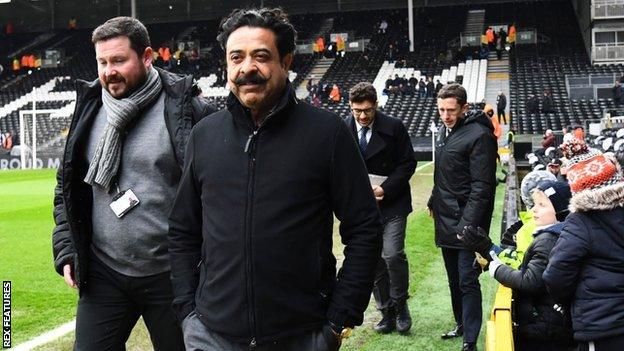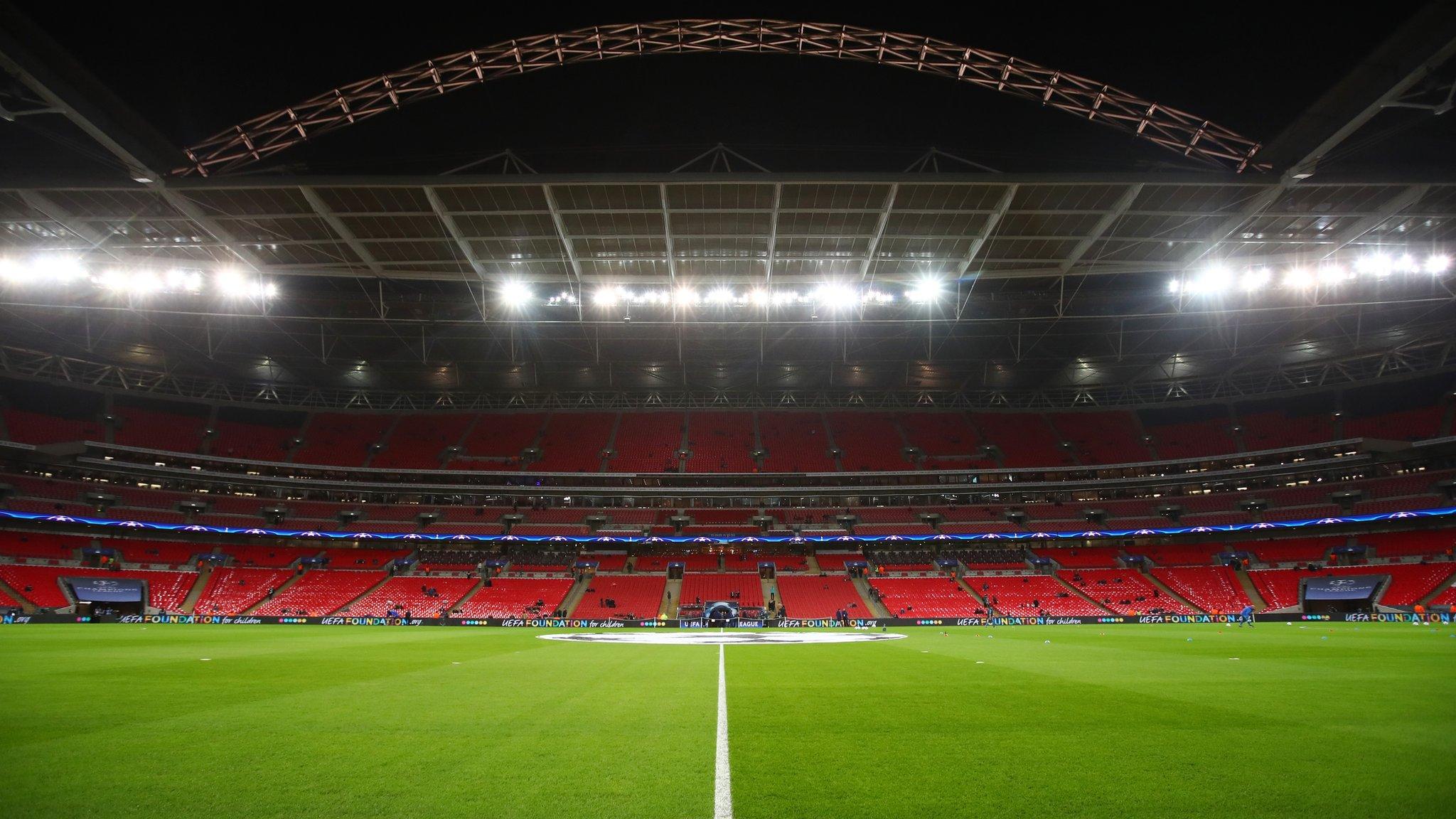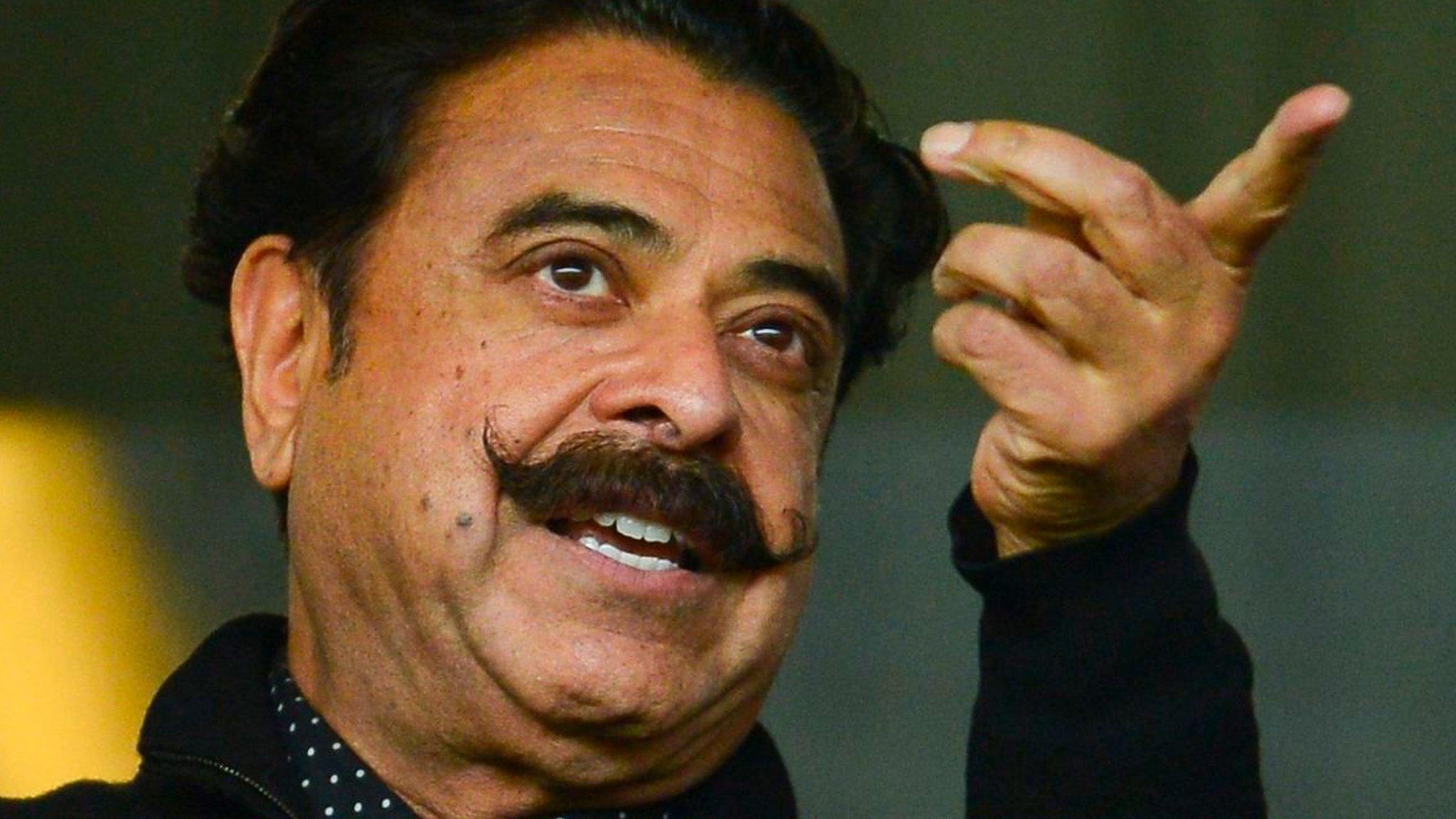Wembley: What next for England and the Football Association?
- Published
- comments
Fulham owner Khan confident of Wembley purchase
Wembley Stadium: home to the England men's football team, the FA Cup final and the venue for several high-profile gigs.
A snip at the £900m Fulham and Jacksonville Jaguars owner Shahid Khan is expected to pay for it? Or an excellent deal for the Football Association looking to sell it?
But what would a sale mean for the England team? Will English football lose its traditions? And what will the FA do with the money?
Will Wembley still host cup finals?
The NFL season begins in September and runs until the beginning of February. Should Jaguars owner Khan purchase the stadium, it means the new landlords would require a revenue stream throughout the summer.
Khan says he understands the "value and tradition" of Wembley and it would make financial and commercial sense for both he and the FA to continue hosting finals there.
The League Cup final traditionally takes place at the end of February, with the FA Cup final - plus competitions such as the FA Trophy, FA Vase and Football League play-offs - coming in May, while the Community Shield precedes the Premier League season in August.
A perfect fit in the Wembley calendar?
Where will England play?
In his letter to FA council members, FA chairman Greg Clarke said any deal would see Wembley remain the home of the England team, but with the option of more games "on the road".
There is the potential for fixtures scheduled in international breaks during the winter to clash with NFL games, meaning England would have to relocate.
But the six years England spent on the road while Wembley was under construction between 2001 and 2007 were welcomed by fans in other parts of the country.
Former England manager Sam Allardyce is also an advocate of playing some international games outside the capital.
"There'd have to be a certain contract that makes sure Wembley is still Wembley and cup finals are still played there, (some) international games there," he said.
"But travelling across the country would balance that off very, very well. With the extra money coming into the FA, spent in the right way on development, grassroots and football in general, that would be a very good thing."
Hodgson would be 'disappointed' if England stopped playing at Wembley
Doesn't every FA have its own national stadium?
No. In fact, the FA did not own the old Wembley until 1999.
Some of the most successful European national teams, such as Germany and Spain, spread their games around the country, while the Stade de France in Paris is owned by a consortium to whom the government pays an annual subsidy.
Meanwhile, Italy play at Stadio Olimpico, shared by Serie A clubs Roma and Lazio and owned by the Italian National Olympic Committee.
England are also the only team among the home nations whose FA owns the national stadium.
Wales' games normally take place at the Cardiff City Stadium, owned by the club, while Northern Ireland's Windsor Park was redeveloped using government funding but is the property of Linfield, who receive £200,000 every year from the Irish Football Association.
Scotland's Hampden Park home is owned by third-tier side Queen's Park. The Scottish FA pays £800,000 a year - £308,907 of which goes to the club via Hampden Park Limited - to rent the ground, but is in talks with Queen's Park to buy it.
So was selling Wembley always the plan?
According to Michael Cunnah, the former chief executive officer of Wembley Stadium, selling the stadium was always considered an option.
"We went into the Wembley Stadium build with the intention of in the future creating a revenue stream that would help to develop grassroots football," he explained.
"Whether you do that by taking profits every year or taking a capital sum, which is now proposed, it is the choice of the FA."
The bid comes with the FA's latest financial results showing it still owes £113m to public bodies such as Sport England, the Department of Culture, Media and Sport and the London Development Agency.
The proposed deal would see the governing body continue to run the £300m-valued Club Wembley hospitality business which helped generate a £58.2m income in the financial year until July 2017.
However, the amount raised by events held at Wembley fell by £6.5m from the previous term, with fewer shows and fewer England games taking place.
The FA said in January it would finish paying for the ground by the end of 2024, and Cunnah says the organisation is in a good place.
"They don't have to sell the stadium, so they can dictate some terms which work for them," he added.
"I would suggest if they sell the stadium for a lot of money and still have all the income from their matches, then they seem to have a good deal."
Where will the money be used?
The FA says if the sale of Wembley is approved all proceeds will be held in trust by the organisation, in governance with stakeholders, Sport England and the government, to "ensure they are allocated to closing the facilities gap and building community assets".
The money is expected to be invested by the FA into the grassroots game, with a potentially huge effect on the provision of coaches, coach educators, artificial pitches and money to revamp facilities.
The first of the FA's Parklife grassroots football hubs in Sheffield could provide the blueprint for further developments.
Opened in 2016, the FA said the centre would be part of a potential £200m investment in such projects over the following five years.
In a letter on Friday, Clarke said one in seven games was lost to the weather during the winter months and only one in three pitches in England was deemed adequate to play on.
Artificial pitches can cope with more matches per week, as well as combating the inevitable disruption caused by frozen and waterlogged surfaces during the harsh winter months.
More investment in artificial pitches means more opportunities to play.

Shahid Khan bought Fulham in 2013
What about other events at the stadium?
Ed Sheeran and Taylor Swift will grace the national stadium's hallowed turf (or at least a well-constructed stage) later this year, while Beyonce, Adele, Coldplay, Bruce Springsteen and the Stone Roses have appeared there in recent times.
In total, Wembley hosted 32 events during its last financial calendar.
Despite it only opening 11 years ago, Khan has suggested the stadium needs an upgrade if it is to offer the kind of state-of-the-art fan experience concert-goers demand.
Marketing shows is not likely to fall under most football associations' remits, but the FA needed the revenue generated from such high-profile events to sustain the upkeep of the stadium.
By selling Wembley, the FA can pass that task on to its new owners while continuing to benefit from the money generated through its Club Wembley packages.
- Published27 April 2018

- Published26 April 2018
